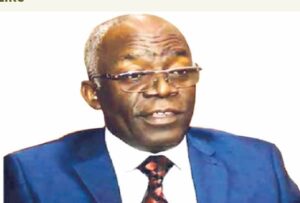Inconsistent Justifications: Examining Falana’s Defense of the EFCC
Inconsistent Justifications: Examining Falana’s Defense of the EFCC

Femi Falana
Femi Falana’s defense of the Economic and Financial Crimes Commission (EFCC) in response to Dr. Olisa Agbakoba’s concerns about its legality is fraught with contradictions and weaknesses. While Falana seeks to present the EFCC as constitutionally sound, his arguments inadvertently undermine key federal principles and neglect the agency’s potential overreach. His selective interpretation of judicial decisions further complicates his position, as it glosses over critical nuances.
One significant flaw in Falana’s defense is his disregard for federalism. This principle, central to the Nigerian Constitution, affirms the autonomy of individual states in governance. Dr. Agbakoba’s critique centers on this tenet, arguing that centralizing anti-corruption efforts undermines state sovereignty. Falana, however, dismisses this vital aspect. He claims the EFCC operates under constitutional provisions like Section 15(5) of the 1999 Constitution, which calls for the eradication of corrupt practices. This broad interpretation risks empowering the EFCC to intervene in state matters, thus disrupting the balance of power between federal and state authorities.
Moreover, Falana’s argument reveals internal contradictions. He supports the EFCC’s authority to pursue corruption nationwide while simultaneously endorsing the principles of federalism, which advocate for decentralization. This inconsistency raises questions about his commitment to federalism and his selective application of constitutional principles. Although the EFCC plays a crucial role in fighting corruption, its operations raise valid concerns regarding federal overreach that Falana fails to fully acknowledge.
Falana also employs a selective interpretation of Supreme Court decisions to support the EFCC’s legitimacy. He references cases such as Attorney-General of Ondo State v Attorney-General of the Federation, which affirmed the constitutional validity of anti-corruption agencies like the ICPC. However, this precedent does not apply directly to the EFCC, whose broader and more intrusive powers differ significantly from the ICPC’s mandate. By failing to engage with the unique challenges posed by the EFCC, Falana’s argument becomes less compelling, relying instead on generalized rulings that do not address federal-state tensions.
Additionally, Falana’s assertion that no court has declared the EFCC unconstitutional exposes a gap in his reasoning. While it is true that the EFCC Act remains intact, this fact does not validate the agency’s actions, especially in light of the resistance from various states against federal encroachment. Numerous state officials and governments have raised alarms about the EFCC’s involvement in state financial affairs, highlighting the ongoing debate about its legitimacy. Falana’s oversimplification of these concerns
TRENDING SONGS
 See How Man That Plans to Divorce His Wife, Gets Shocked When She Leaves Him First With Their 5 Kids
See How Man That Plans to Divorce His Wife, Gets Shocked When She Leaves Him First With Their 5 Kids
 Tragic Land Dispute: Man Kills Father in Imo, Pastor Arrested for Rape
Tragic Land Dispute: Man Kills Father in Imo, Pastor Arrested for Rape
 Nigeria Grants Air Tanzania Passage for Direct Flights
Nigeria Grants Air Tanzania Passage for Direct Flights
 KWAM 1 vs KWAM 2: Nigerians Call Out Inconsistent Treatment in Aviation Offense Cases
KWAM 1 vs KWAM 2: Nigerians Call Out Inconsistent Treatment in Aviation Offense Cases
 Nigerian Soldiers Light Up Social Media with Energetic Dance Moves
Nigerian Soldiers Light Up Social Media with Energetic Dance Moves
 Sniper Scandal: See How Chief Ajibade Forces Corn Thief to Drink Poison; Accused Arrested, Monarch Clear Air(VIDEOS)
Sniper Scandal: See How Chief Ajibade Forces Corn Thief to Drink Poison; Accused Arrested, Monarch Clear Air(VIDEOS)
 Woman Finds Out Husband Married Another Wife Through Facebook After Having Three Kids Together
Woman Finds Out Husband Married Another Wife Through Facebook After Having Three Kids Together
 If Anything Goes Wrong During Labor, Save Me—Not the Baby”: Is This a Normal Statement from a Responsible Woman?
If Anything Goes Wrong During Labor, Save Me—Not the Baby”: Is This a Normal Statement from a Responsible Woman?
 See How Jealous Partner Allegedly Sets Girlfriend and Sister on Fire
See How Jealous Partner Allegedly Sets Girlfriend and Sister on Fire
 “Thunder Will Strike You” – Super Falcons Star Okoronkwo Speaks Out on Threatening Messages
“Thunder Will Strike You” – Super Falcons Star Okoronkwo Speaks Out on Threatening Messages
Share this post with your friends on ![]()













